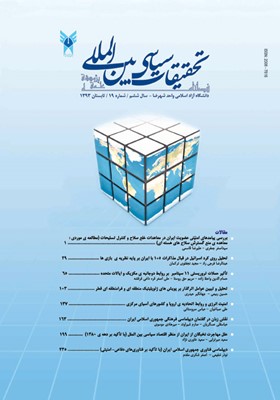تحلیل رویکرد اسرائیل در قبال مذاکرات 1+5 با ایران بر پایه نظریه بازی ها
محورهای موضوعی : علوم سیاسی- روابط بین المللعبدالرضا فرجی راد 1 , مجید نجفلوی ترکمان 2
1 - استادیار گروه جغرافیای سیاسی دانشگاه آزاد اسلامی واحد علوم و تحقیقات تهران
2 - دانشجوی کارشناسی ارشد دانشکده روابط بین الملل وزارت امورخارجه
کلید واژه: ایران, اسرائیل, نظریه بازی ها, مذاکرات 1+5, پرونده هسته ای,
چکیده مقاله :
دیپلماسی به عنوان حوزه موضوعی در روابط بین الملل هدف تحلیل نظریه پردازان بازی بوده است. از دیدگاه این نظریه پردازان در ساده ترین شکل دیپلماسی بین کشورها، دو دولت تصور می شود که یکی از آنها پیشنهاد دهنده است و دیگری چند راه پیش روی دارد، یکی از عوامل اساسی در انتخاب میان گزینه های مختلف، ارزش انتظاری دستاوردی است که یک دولت از گزینه های پیش رو با توجه به عامل تنزیل زمان تخمین می زند. با توجه به این اصل، مذاکرات جمهوری اسلامی ایران و 1+5 در سالهای اخیر با فراز و نشیب های فراوانی روبرو بوده است. در این پژوهش هدف مشخص کردن جواب این سؤال است که اسرائیل خواهان چه نتیجه نهایی از مذاکرات 1+5 با ایران است و چه فعالیتهایی برای رسیدن به خواسته مطلوب خود انجام داده است؟در همین راستا تلاش شده است، این مسئله در چارچوب بازی باحاصل جمع صفر تحلیل و بررسی شودو پرداختهای مختلفی که دو طرف بازی یعنی ایران (بازیکن الف) و اسرائیل (بازیکن ب) در بین سالهای 86 تا 91 داشته اند را مورد ارزیابی و تحلیل قرار دهیم.
Abstract Diplomacy as a subject area in international relations has been the object of analysis by game theory theorist. From the view point of these theorists in the simplest form of diplomacy between countries it is assumed that there are two governments. One of them gives suggestion and the other one has several options before it. One accepts the offered suggestion; the other suggests a mutual option or disrupts the negotiation. If the second party puts forward mutual suggestion option, the first government faces a similar scenario which mentioned above. This process eventually ends with acceptance of one option or disrupting the whole game. One of the basic factors in choosing among different options is the expecting value of the gain which a government guesses can get from the option before her taking into consideration the passage of time. Taking into view the above principle, the negotiations of the Islamic Republic of Iran with 5+1 have gone through ups and downs. Both the parties for reaching a common solution and taking further steps have gone through a lengthy path. Meanwhile different actors with their own interest in mind have tried to follow and accompany the negotiating parties. Among these actors Israel has tried its best to weaken Iran’s position in negotiations process. From the view point of the authorities of Israel regime conclusion of any agreement which recognizes Iran’s right to enrichment is not good news for Israel. The inherent suspicion and distrust of Iran does not allow Israel to wish success for such agreement. But on the other hand Israel fears her isolation and she is compelled to accept such agreement. The present article wants to answer this question that from Israel view point what feature ideal final result of 5+1 and Iran negotiation has and what activities Israel have done to bring about that ideal model. In this direction the paper has tried to analyze the problem within the framework of game theory with zero-sum result. The cost which both parties i.e. Iran (player A) and Israel (player B) pay (in terms of policies which they pursue) between 2007 and 2012 have evaluated and analyzed.


